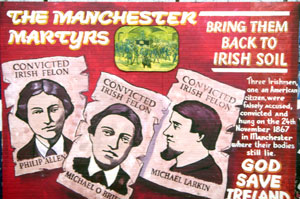Writing and Context
“God Save Ireland” was first arranged by T.D. Sullivan in 1867. It was written in the wake of the Manchester Outrages in the same year, during which three members of the Irish Republican Brotherhood (Michael O’Brien, William Philip Allen, Michael Larkin) were hanged for the murder of a Manchester police officer (Sergeant Charles Brett). Brett held the keys to the van that was transporting two previously arrested men (Thomas J. Kelly, Timothy Deasy) when the van was attacked by a large group of Fenians. The goal of the ambush was to release the prisoners without bloodshed. Upon reaching the van, however, the police fled the scene and the rescue crew was left without a way to open the door. They unsuccessfully attempted to use rocks to break it down until a man named Peter Rice decided to try and shoot the lock with his revolver. At that very moment, Brett was looking out of the keyhole in an attempt to see what was going on outside of the van. He died from that gunshot.
With Seargeant Brett dead, prisoners inside the van passed his key outside and were able to escape. Deasy and Kelly were whisked away, still in handcuffs.

Hours after the incident, the current mayor of Manchester reported that “no less than 32 persons supposed to have been concerned in the outrage are now in the hands of the police” (Neill 1867), although the two escaped prisoners were never recaptured. The three hanged members of the Brotherhood soon came to be known as the Manchester Martyrs, and appear in the song as such: “High upon the gallows tree swung the noble-hearted three.”
Although Rice was the one that pulled the trigger to kill Brett, he was never executed alongside Larkin, O’Brien, and Allen.
After Manchester
Despite being written in the context of a single event in 1867, “God Save Ireland” persisted well into the 1900s, and was famously sung during the Easter 1916 rising. The current anthem, Amhran na bhFiann, was not written until 1907 and was published in an Irish newspaper in 1912 (our own national anthem, by contrast, was not officially adopted until 1931). Until this current anthem was officially adopted, Sullivan’s tune represented an unofficial anthem for Fenians striving for a unified Ireland.
Neill, Robert. “THE FENIAN OUTRAGE IN MANCHESTER.” The Tablet. N.p., n.d. Web. 04 Aug. 2015.
